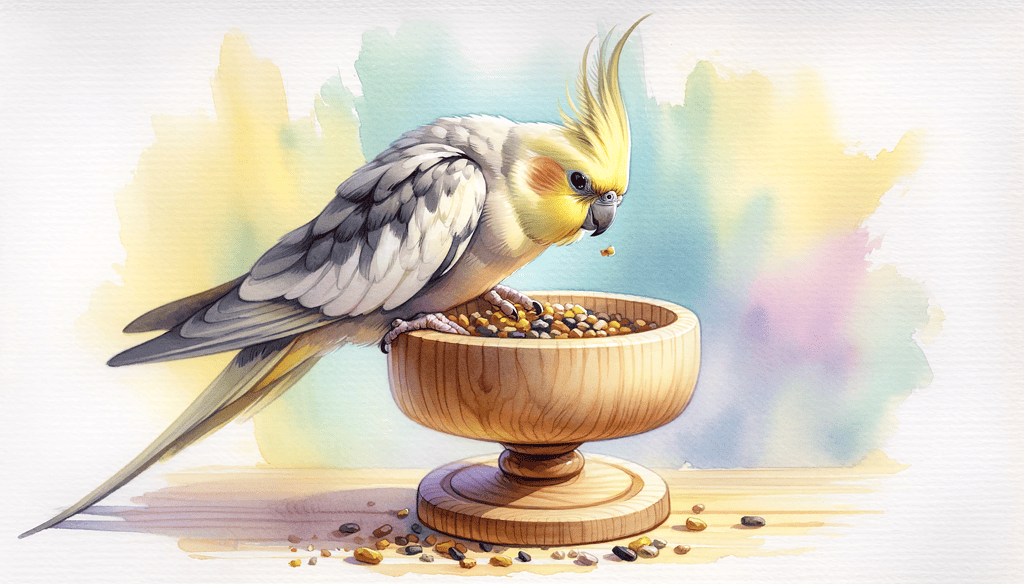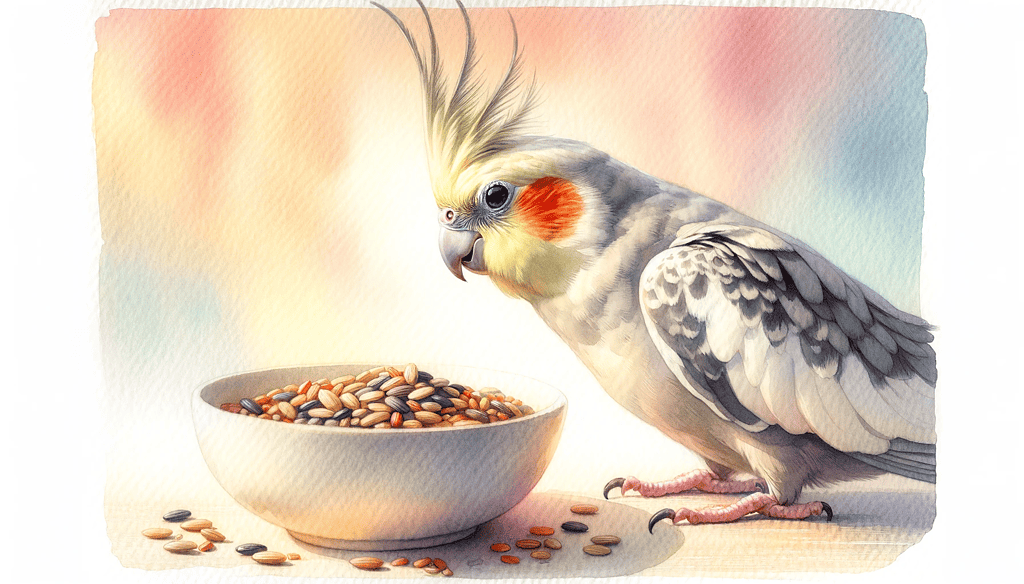
Cockatiels, with their vibrant personalities and captivating crests, have become one of the most beloved pet birds worldwide. But how often should these feathered companions be fed to ensure their optimal health and happiness? Let’s dive in.
As a general rule, the feeding frequency for cockatiels varies based on their age and developmental stage. From needing feeds every 2 hours as newborns to twice daily meals as mature birds, it’s crucial to tailor their diet accordingly.
Stick around as we delve deeper into the intricacies of a cockatiel’s feeding schedule, ensuring you’re equipped with the knowledge to provide the best care for your avian friend.
Cockatiel Feeding Schedule by Age
The feeding requirements of cockatiels can be a bit intricate, especially when considering their age. Let’s break down the feeding schedule based on their developmental stages, ensuring your feathered friend gets the right nutrition at the right time.
1-7 Day Old Baby Cockatiel
When cockatiels are born, they are entirely dependent on their caregivers for nourishment. Their tiny bodies are fragile, and their nutritional needs are specific.
- Description of newborn cockatiels: At this stage, baby cockatiels are blind, featherless, and incredibly delicate. Their primary source of nutrition is a special formula designed to mimic the regurgitated food they would receive from their parents in the wild.
- Feeding frequency: Every 2 hours. Yes, it’s a demanding schedule, but these little ones need all the energy they can get to grow and thrive.
- Amount: Start with 1 ml of formula. As the days progress, you can gradually increase this amount as the chick grows and its appetite expands.
2-3 Week Old Young Cockatiel
As your cockatiel chick grows, you’ll notice some significant developmental changes. This period is crucial as they transition from helpless newborns to more independent young birds.
- Developmental changes: Beginnings of their adult feathers. They start as small, spiky protrusions and eventually grow and unfurl into mature feathers. By the end of this period, your cockatiel will start to open its eyes, giving it a new way to explore the world.
- Feeding frequency: Every 3 hours. As they grow, their stomachs can hold more food, allowing for slightly longer intervals between feedings.
- Amount: 4-5 ml each time. This provides them with the energy they need to continue their rapid growth and development.
3-4 Week Old Cockatiel
As your cockatiel continues to grow, you’ll notice it developing more feathers and becoming more active. This stage is crucial for monitoring their digestion and ensuring they’re getting the right nutrients.
- Observing the bird’s crop for digestion: The crop is a part of a bird’s digestive system where food is stored before it’s digested. It’s essential to keep an eye on this to ensure your cockatiel is digesting its food properly. If the crop remains full and doesn’t empty within 4 hours, it could indicate a problem with your bird’s digestive system.
- Feeding frequency: At this age, you can reduce the feeding frequency to every 4-5 hours. This allows the bird to digest its food properly and ensures it’s getting the right amount of nutrients.
- Amount: 6 ml per feed. This provides them with the energy they need to continue their rapid growth and development.
4-5 Week Old Cockatiel
Your cockatiel is now nearing the end of its chick phase and is starting to show signs of independence. This is the time when you can introduce them to new foods and start the weaning process.
- Introduction to weaning foods: As your cockatiel grows, it’s essential to introduce them to a variety of foods. This ensures they get all the nutrients they need and prepares them for a diet of solid foods.
- Feeding frequency: 2-3 times a day. This allows them to start exploring other food sources and reduces their dependence on formula.
- Amount: 8 ml per feed. This ensures they’re getting enough nutrients as they transition to solid foods.
6-7 Week Old Cockatiel
By the time your cockatiel reaches 6-7 weeks old, you’ll notice a significant shift in their behavior and feeding habits. This is a pivotal time in their development, marking their transition from a dependent chick to an independent young bird.
- Transition to a cage and independent feeding: At this age, if you observe that your cockatiel is showing signs of independence, it’s time to introduce them to their own cage. This new environment will give them the space they need to explore, play, and learn to feed on their own. Remember, while they’re transitioning, it’s essential to keep a close eye on them to ensure they’re eating well.
- Introduction of mixed bird seeds and other treats: As they grow, their dietary needs evolve. Introducing a mix of bird seeds and other treats will ensure they get a balanced diet. Seeds like millet, sunflower, and finger millet are not only nutritious but also a favorite among cockatiels.
- Feeding frequency: At this stage, your cockatiel will require feeding once or twice a day. They’ll start to eat more during each feeding session, preparing them for the transition to a mature diet.
Transition from Dependent to Independent Feeding:
| Age (Weeks) | Feeding Frequency | Food Type | Amount |
| 1-2 | Every 2-3 hours | Baby Birds Food Formula | 1-5 ml |
| 3-4 | Every 4-5 hours | Baby Birds Food Formula | 6 ml |
| 4-5 | 2-3 times a day | Formula + Weaning Foods | 8 ml |
| 6-7 | Once or twice a day | Mixed Seeds + Treats | Varies |
Feeding Mature Cockatiels
As your cockatiel matures, their dietary needs and feeding habits will stabilize. It’s crucial to maintain a consistent feeding schedule and ensure they’re getting a balanced diet.
- Recommended feeding times: Mature cockatiels thrive on routine. It’s best to feed them twice a day, once in the morning and once in the early evening. This mimics their natural feeding habits in the wild and ensures they get the nutrients they need to stay healthy.
- Amount: A mature cockatiel will typically consume between 30-40 grams of seeds and pellets daily. It’s essential to monitor their intake and adjust as needed based on their activity level and overall health.
How Different Factors Affect the Feeding Schedule?

Every cockatiel is unique, and various factors can influence their feeding schedule. It’s essential to understand these factors to provide the best care for your feathered friend.
Table that lists each factor and its potential impact on the feeding schedule.
| Factor | Potential Impact on Feeding Schedule |
| Health | Birds with certain health conditions might have specific dietary needs. |
| Weight | Overweight birds might need a restricted diet, while underweight ones may need more. |
| Diet Type | Some diets might require more frequent feedings, while others might be less often. |
| Activity Level | Active birds might need more calories compared to less active ones. |
Tips on Creating a Suitable Feeding Regimen for Cockatiels
When it comes to ensuring the health and happiness of your cockatiel, establishing a consistent feeding routine is paramount. Just like us, these delightful birds thrive on routine. It’s not just about what they eat, but also when and how they eat.
- Consistency is Key: It’s essential to feed your cockatiel at the same times every day. This not only helps with digestion but also sets a routine that your bird can anticipate.
- Treats in Moderation: While it’s tempting to spoil our feathered friends, treats should make up no more than 5% of their daily diet. Overindulgence can lead to health issues.
- Quality Over Quantity: Incorporate high-quality pellets into their diet. These are often nutritionally balanced and can provide essential nutrients.
- Fresh is Best: Offer a variety of fresh fruits and vegetables. These can be a great source of vitamins and minerals. However, be aware of toxic foods like apple pips, avocado, cherries, and chocolate.
- Monitor Their Intake: Keep an eye on how much your cockatiel is eating. This can help in preventing obesity, which can lead to other health complications.
Conclusion
Understanding the feeding schedule of cockatiels is crucial for their health and well-being. As we’ve explored, their dietary needs change significantly as they grow, from the frequent feedings of newborns to the more structured meals of mature birds. Ensuring they receive the right nutrition at each stage is paramount. So, I urge you to take the time to get to know your feathered friend’s dietary needs.
Did you find this guide helpful? I’d love to hear your thoughts in the comments below. If you’ve benefited from this article, please consider sharing it with fellow bird enthusiasts. Your feathered friend deserves the best, and knowledge is the first step to providing it.
Frequently Asked Questions
How to know if a cockatiel is not getting enough to eat?
Look for signs like lethargy, weight loss, or a change in their droppings. If in doubt, consult with a veterinarian.
What are the signs of malnutrition in cockatiels?
Malnutrition can manifest as dull feathers, weakness, or even behavioral changes. It’s essential to provide a balanced diet to prevent this.
Are there any special diets for cockatiels with health conditions?
Yes, depending on the health condition, a specialized diet might be recommended. Always consult with a veterinarian to ensure you’re meeting your bird’s specific needs.
